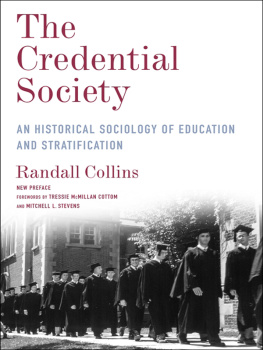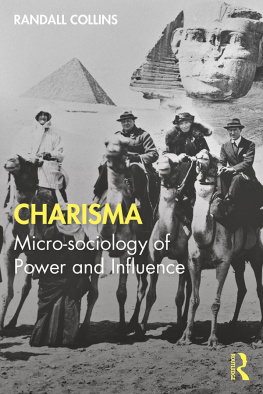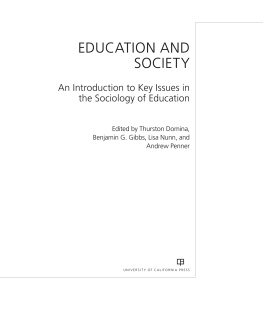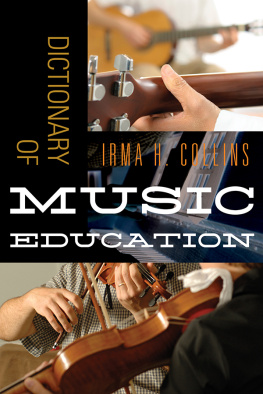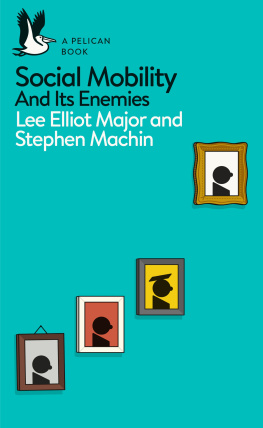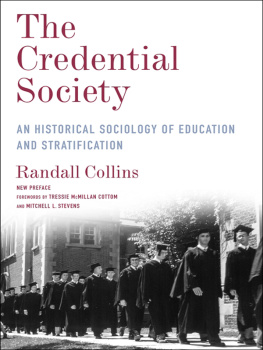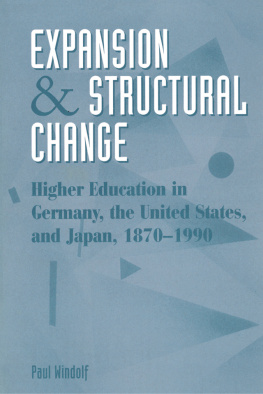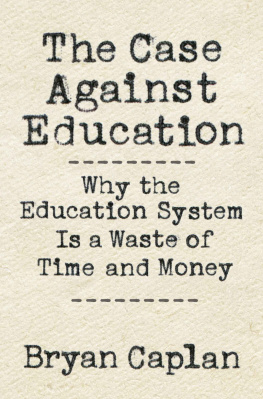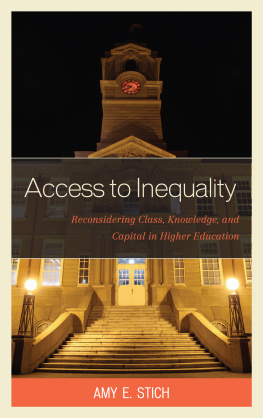Table of Contents
The Credential Society
Legacy Editions
Legacy Editions
Edited by Howard S. Becker and Mitchell Duneier
Learning to Labor: How Working-Class Kids Get Working-Class Jobs, Paul Willis, with foreword by Stanley Aronowitz
The Levittowners: Ways of Life and Politics in a New Suburban Community, Herbert J. Gans, with foreword by Harvey Molotch
On Becoming a Rock Musician, H. Stith Bennett, with foreword by Howard S. Becker
Morals and Markets: The Development of Life Insurance in the United States, Viviana A. Rotman Zelizer, with foreword by Kieran Healy
The Credential Society
AN HISTORICAL SOCIOLOGY OF EDUCATION AND STRATIFICATION
Randall Collins
New preface
Forewords by Tressie McMillan Cottom
and Mitchell L. Stevens
Columbia University Press / New York
Columbia University Press
Publishers Since 1893
New York Chichester, West Sussex
cup.columbia.edu
Originally published in 1979 by Academic Press, Inc.
Copyright 2019 Columbia University Press
All rights reserved
E-ISBN 978-0-231-54978-3
Cataloging-in-Publication Data available from the Library of Congress.
ISBN 978-0-231-19234-7 (cloth)
ISBN 978-0-231-19235-4 (paper)
ISBN 978-0-231-54978-3 (e-book)
A Columbia University Press E-book.
CUP would be pleased to hear about your reading experience with this e-book at .
Cover design: Mary Ann Smith
Cover image: Sally Anderson Archive Photos / Alamy Stock Photo
The role played in former days by the proof of ancestry as prerequisite for equality of birth, access to noble prebends and endowments, and wherever the nobility retained social power, for the qualifications to state offices, is nowadays taken by the patent of education. The elaboration of the diplomas from universities, business and engineering colleges and the universal clamor for the creation of further educational certificates in all fields serve the formation of the privileged stratum in bureaus and in offices. Such certificates support their holders claims for connubium with the notables (in business offices too they raise hopes for preferment with the bosss daughter), claims to be admitted into the circles that adhere to codes of honor, claims for a status-appropriate salary instead of a wage according to performance, claims for assured advancement and old age insurance, and above all, claims to the monopolization of socially and economically advantageous positions.
If we hear from all sides demands for the introduction of regulated curricula culminating in special examinations, the reason for this is, of course, not a suddenly awakened thirst for education, but rather the desire to limit the supply of candidates for these positions and to monopolize them for the holders of educational patents. For such monopolization, the examination is today the universal instrumenthence its irresistable advance. As the curriculum required for the acquisition of the patent of education requires considerable expenses and a long period of gestation, this striving implies a repression of talent (of the charisma) in favor of property, for the intellectual costs of the educational patent are always low and decrease, rather than increase, with increasing volume. The old requirements of a knightly style of life, the prerequisite for capacity to hold a fief, is nowadays in Germany replaced by the necessity of participating in its surviving remnants, the dueling fraternities of the universities which grant the patents of education; in the Anglo-Saxon countries the athletic and social clubs fulfill the same function.
MAX WEBER (1968:1000; originally published 1923)
Contents
by Tressie McMillan Cottom
by Mitchell L. Stevens
C redential inflation is the rise in educational requirements for jobs as a rising proportion of the population attains more advanced degrees. The value of a given educational certificate or diploma declines as more people have them. In the United States, high school diplomas (i.e., twelve-year secondary school) were comparatively rare before 1940; now high school degrees are so commonplace that their job value is worthless. University attendance is now over 60 percent of the youth cohort and is on the way to the same fate as the high school degree. The main thing that inflated degrees are worth is to plough them back into the educational market, seeking still higher degrees. This in principle is an endless process; it could very well reach the situation of the Chinese mandarin class during the Ming and Xing dynasties, when students continued sitting for exams into their thirties and fortiesonly now this would affect the vast majority of the population instead of a small elite. Different countries have gone through educational inflation at different rates, but from the second half of the twentieth century onward, all of them have followed this path.
Educational degrees are a type of currency of social respectability, which are traded in for access to jobs. Like any currency, it inflates prices (or reduces purchasing power) when autonomously driven increases in monetary supply chase a limited stock of goods, in this case chasing a diminishing pool of middle-class jobs. Educational inflation builds on itself; from the point of view of the individual degree-seeker, the best response to its declining value is to get even more education.
Although this is the primary mechanism of educational expansion, it is bolstered by prevailing technocratic ideology. Rising technical requirements of jobs drive out unskilled labor, the argument goes, and todays high-skilled jobs demand steadily increasing levels of education. Forty years ago, in The Credential Society (1979), I assembled evidence to show that technological change is not the driving force in rising credential requirements. The content of education is not predominantly set by technological demand; most technological skillsincluding the most advanced onesare learned on the job or through informal networks, and the bureaucratic organization of education at best tries to standardize skills innovated elsewhere. In updated research on credential inflation vis--vis technological change, I have seen nothing that overturns my conclusions published in 1979. The outburst of information technology that transformed the postindustrial economy was led by people such as Steve Jobs, who dropped out of college to seize opportunities to create new products and new business enterprises; and this has been the pattern with the entrepreneurs who created Facebook, Google, Tesla, and others by exploiting the technological edge. This happens because the technological edge is found out there in the networks of people working in the next-to-the-last-minute edge. School systems standardize what has already happened; that is the reason dropouts who seize the opportunities for innovation directly have greater success than those who follow the bureaucratic path through the step by step of required years in school systems and the hierarchies of already full-grown organizational employers.
It is true that a small proportion of jobs benefit from scientific and technical education, but that is not what is driving the massive expansion of education. It is implausible that in the future the entire labor force will be scientists or skilled technicians. Indeed, the largest area of job growth in rich countries has been low-skilled service jobs for which it is cheaper to hire human labor than to automate.

